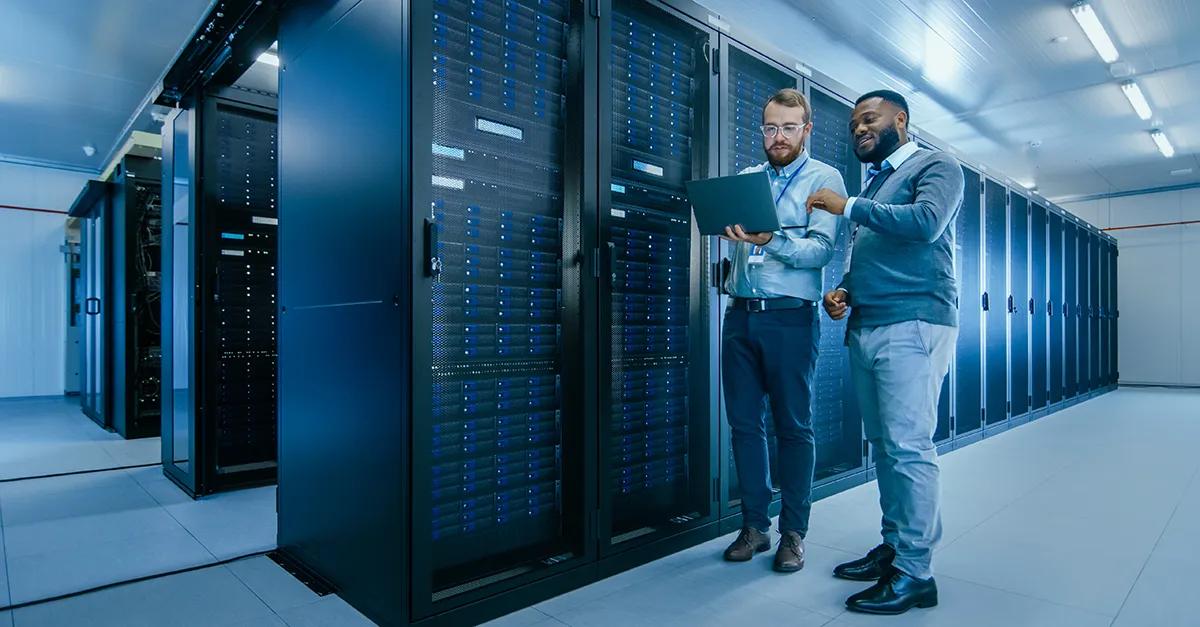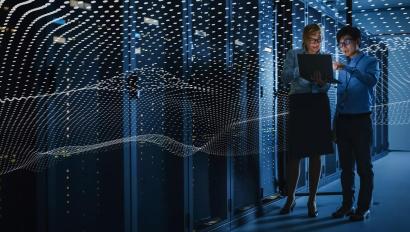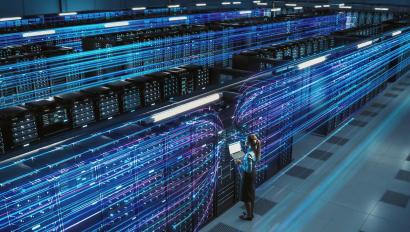How Data Center Physical Security Intersects with Cybersecurity

Every organization cares about protecting its data, but for the data center industry, it's the very core of your mission and promise to customers. Data is the lifeblood of any modern business, and data centers are entrusted with safeguarding it. This responsibility extends beyond just the digital realm; it also includes the physical security of a data center itself.
That's why it's essential for security teams to think broadly about data center security: it's a combination of cybersecurity and physical security. They are two sides of the same coin, intricately intertwined and reliant on each other for effective protection.
Leveraging Tech for Enhanced Physical Security of a Data Center
Data centers are constantly evolving, adopting new technologies to enhance security. Here are some key ways technology is being used to bolster physical security for data centers:
- Keeping Illicit Data Devices Out: Implementing technologies like metal detectors and millimeter wave scanners can help prevent the entry of unauthorized data devices like USB drives that could be used to introduce malicious code or steal data.
- Maintaining Security Infrastructure: Just like your computer needs regular updates, data center security infrastructure requires continuous maintenance. Keeping firmware and software up to date ensures the latest security patches are applied, mitigating potential vulnerabilities that attackers might exploit.
- Managing User Access: Controlling who has physical accesses to the data center is paramount. This involves robust password management, access control lists (ACLs) that define specific user privileges, and the prompt deletion of accounts for former employees. This principle of least privilege is essential for maintaining a secure environment.
Data Center Perimeter Security: Endpoint Protection
Data centers rely on a multitude of devices, including security cameras, sensors, and access control systems. These endpoints are crucial for monitoring and controlling access, but they can also become vulnerable points of entry for attackers. To protect against physical security threats:
- Port Security: Hackers can gain access to the security network by plugging into a network cable that was installed to reach an external camera or plugging into open USB ports on security endpoints. Port security can be used to protect against such connections by providing an additional layer of protection to restrict unauthorized devices from connecting to the router or switch ports.
Port security makes use of the hard-coded MAC address of the authorized device, which, unlike an IP address, is difficult to change. If a device is connected to a switch or router that doesn't match the registered MAC address, then the system can block access to that device and raise an alarm for follow up. - Device management: Each device is also a potential entry point that could be used to malicious ends. You can mitigate this risk through a robust program for device passwords and encryption of data. It’s also essential to update system software and device firmware regularly as manufacturers respond to new threats. Proactive management through scheduled reviews either in-house or from your security provider is the best strategy to reduce risk.
Designing for Security: Proactive Measures
Building security into the very design of the data center is crucial for mitigating physical security risks. This involves:
- Logical Separations: Security infrastructure such as access control points or cameras can be grouped into virtual local area networks (VLANs) that instruct system elements to only allow access to specific authorized devices and to deny all other requests.
- Access Control Lists (ACLs): ACLs act as digital gatekeepers, controlling access to specific areas based on user identities and permissions. This ensures only authorized personnel can access sensitive parts of the facility, further strengthening the security posture.
The Future of Data Center Security
The landscape of cyber threats is constantly evolving. As technology advances, so do the methods attackers employ to breach security. Data centers need to stay ahead of these threats by:
- Adopting Automation: Automating security tasks like vulnerability scanning and threat detection helps streamline security processes, improving efficiency and reducing the risk of human error. Automation can also check and verify that the installed firmware and software are current throughout physical security systems.
- Embracing AI and Machine Learning: AI-powered systems can analyze vast amounts of data to detect suspicious activity and predict potential attacks. This proactive approach allows for quicker responses and more effective mitigation strategies.
- Fostering Collaboration: Sharing information and best practices with peers and industry experts is crucial to stay informed about emerging physical security threats and develop innovative security solutions.
Meeting Data Center Security Standards
In the digital age, securing data is paramount, and data centers play a vital role in this endeavor. It's not just about protecting against cyber threats; it's about taking a holistic approach, encompassing both physical security and the digital realms.
By leveraging technology, implementing robust access controls, and building security into the core design, data centers can effectively safeguard the invaluable data they hold, ensuring the trust and confidence of their customers.
Disclaimer: By using the Blog section of this website ("Blog"), you agree to the terms of this Disclaimer, including but not limited to the terms of use and our privacy policy. The information provided on this Blog is for information purposes only. Such information is not intended to provide advice on your specific security needs nor to provide legal advice. If you would like to speak to a Security representative about your specific security needs, please contact us.























